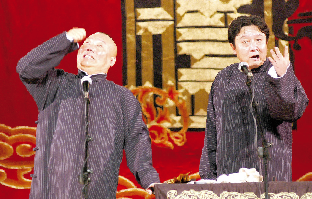 |
Large Medium Small |

He was timid. His pauses were too long. He seemed to be on the verge of a stage fright-induced nervous breakdown.
But Joe Wong’s appearance on the David Letterman show was a triumph. It was his American network debut, an extremely significant step in the launch of any professional comedian in the North America market.
What he did was not only a milestone in his budding career, but suggests something much larger. It shows to the comedy-crazy American public that a Chinese can be funny.
Americans tend to put a high value on sense of humor. If you browse personal ads, you’ll encounter it as a prerequisite as often as you see “owning an apartment and a car” mentioned in the Chinese classified section.
For everything Lin Yutang, the great exponent on Chinese culture, said, Chinese, in the eyes of ordinary Americans, are seen as smart, but not funny. We are not just unfunny, but geeky. Joe Wang retains the typical geeky look, but when he hit the punchlines he essentially subverted the stereotype about this Chinese trait.
Of course there are funny and unfunny people in every ethnicity. But from my observation, Americans take the business of comedy much more seriously than we Chinese. So, I won’t be surprised that percentage-wise there are more funny Americans than funny Chinese.
Inside China, certain parts of the country have yielded more funnymen. Take Zhao Benshan, the reigning king of Chinese comedy. He inherited the Northeastern tradition of “two-men act”, a local form of standup comedy, and broadened its appeal to the whole nation. When I first caught a show of this folk art some years ago, I was astonished at the similarity it has with American comedy. For example, it is chockeful of self-deprecating humor, of which the standard “crosstalk” (xiangsheng) is totally devoid.
Joe Wong, despite the Hong Kong spelling of the last name, hails from Northeastern China. His material, which I assume he wrote, is sharp and witty. It’s built on observations of cultural differences. And he’s not afraid to elicit laughs at his own expense.
It was obvious Wong was not comfortable with the English language. But the fact he took this cottage industry seriously and has enough gigs to turn professional has made him a standout. If Chinese Americans are more artistically adventurous, the stolid, tongue-tied image will be chipped away, bringing us closer to those from other countries and cultures. When people of differing backgrounds meet, nothing breaks the ice like a good joke.
In light of Wong’s breakthrough, it is sad there are so few great comedians in China. Many still stick to the old formula, oblivious to advances in the art of comedy happening elsewhere. But the few who have put their mark indelibly on the stage in recent years, including Guo Degang of Beijing and Tianjin, Zhou Libo of Shanghai, Li Boqing of Chengdu, have developed styles uniquely their own, with material based on dialects and local points of interest, but sharing many of the traits of American comedy.
Comedy is hard. Joe Wong deserves our cheers.